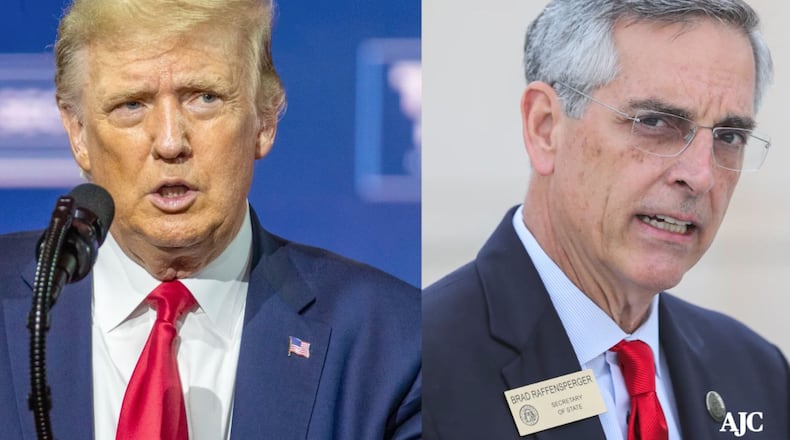Georgia plays a major role in a new report in which congressional investigators lay out evidence of criminal wrongdoing by former President Donald Trump in the events leading up to the Jan. 6 attack on the U.S. Capitol.
A U.S. House of Representatives committee met Monday and voted unanimously to sign off on the report while also reminding the public of the evidence that members said outlined how Trump and his allies attempted to overturn the 2020 election and incited the violent mob two months later.
“Jan. 6, 2021, was the first time one American president refused his constitutional duty to transfer power peacefully to the next,” Vice Chairwoman Liz Cheney said. “In our work over last 18 months, the select committee has recognized our obligation to do everything we can to ensure this never happens again.”
During the meeting and in the report, the committee repeatedly cited then-President Trump’s phone call to Georgia Secretary of State Brad Raffensperger asking him to find votes. It also brought up his false voting fraud allegations against two Fulton County election workers and other actions in Georgia.
One measure of the Peach State’s prominence in the panel’s case for criminal charges: The word “Georgia” appears 60 times in the 154-page executive summary released Monday during the committee’s final meeting.
The committee is expected to release its full report on Wednesday in a document expected to clock in at more than 1,000 pages.
On Monday it voted to refer potential criminal charges against Trump and his allies to the U.S. Justice Department. The panel said there is substantial evidence that Trump and others are guilty of obstructing congressional certification of Biden’s victory, conspiracy to defraud the United States, conspiracy to make false statements and inciting or assisting an insurrection.
The Justice Department is not obligated to follow the panel’s recommendations, but it is already investigating Trump’s actions leading up to the Jan. 6 attack. Fulton County District Attorney Fani Willis also is investigating.
The congressional report offers a preview of evidence that could support criminal charges against the former president. And events in Georgia are mentioned throughout.
Four days before the Jan. 6 attack, Trump urged Raffensperger to “find” the 11,780 votes he needed to prevail in Georgia. The report cites the call as an example of Trump’s effort to pressure officials to change election results in Georgia and other states.
During Monday’s meeting, California Rep. Adam Schiff said that conversation was the “most dramatic example of this campaign of coercion.
“During that call, President Trump again repeated conspiracy theories about the election that his own appointees of the Department of Justice and already debunked,” Schiff said. “Trump also made what Secretary Raffensperger accurately considered a threat, suggesting that Raffensperger and his attorney, that they could be subject to criminal prosecution if they didn’t follow through with his demands.”
The report also highlights the Raffensperger phone call as evidence that Trump knew his fraud allegations were false. It quotes Raffensperger explaining to Trump why various voting fraud allegations were false, then quotes the former president making the same allegations again later.
One example: Trump claimed thousands of dead people voted in Georgia. Raffensperger told Trump that investigators found only two dead voters (state investigators later found a total of four - all involving people casting ballots for deceased relatives).
Nonetheless, Trump repeated the false claim during the Jan. 6 rally that devolved into a Capitol riot. The report cited numerous other examples of Trump being informed that his fraud allegations were false, then repeating the claims anyway.
The report also says Trump disregarded warnings that his false allegations could inspire violence. It cites the Trump team’s false claim that two Fulton County election workers committed fraud. Investigators quickly debunked the claim, but Trump’s team kept repeating it. The workers endured threats and harassment, and one fled her home.
Snippets of testimony from those election workers, mother and daughter Ruby Freeman and Shaye Moss, were shared during Monday’s meeting. Both are shown talking about the threats of violence and fears they faced after being falsely accused of misconduct.
“Do you know how it feels to have the president of the United States to target you?” Freeman told the committee in June. “The president of the United States is supposed to represent every American, not to target one.”
The congressional report also says Trump disregarded Raffensperger deputy Gabe Sterling’s December 2020 warning that false fraud claims could lead to violence. Sterling cited death threats against Raffensperger, himself and an election technician in Gwinnett County.
After a journalist tweeted a video clip of Sterling’s remarks, Trump shared the post but “doubled down on demonizing Georgia election workers in spite of Sterling’s stark and detailed warning,” according to the report.
Trump’s efforts to enlist the Justice Department in his campaign to overturn the election also focused on Georgia. A Trump ally at the department wanted to send a letter to Gov. Brian Kemp and other Georgia officials, urging them to convene a special legislative session to consider voiding Biden’s victory.
The letter cited DOJ concerns about extensive voting fraud in Georgia. But DOJ had no such concerns – it had already investigated the claims and found no evidence to support them.
DOJ officials refused to send the letter. The resulting showdown with Trump ultimately cost Atlanta U.S. Attorney Byung “BJay” Pak his job.
Keep Reading
The Latest
Featured



